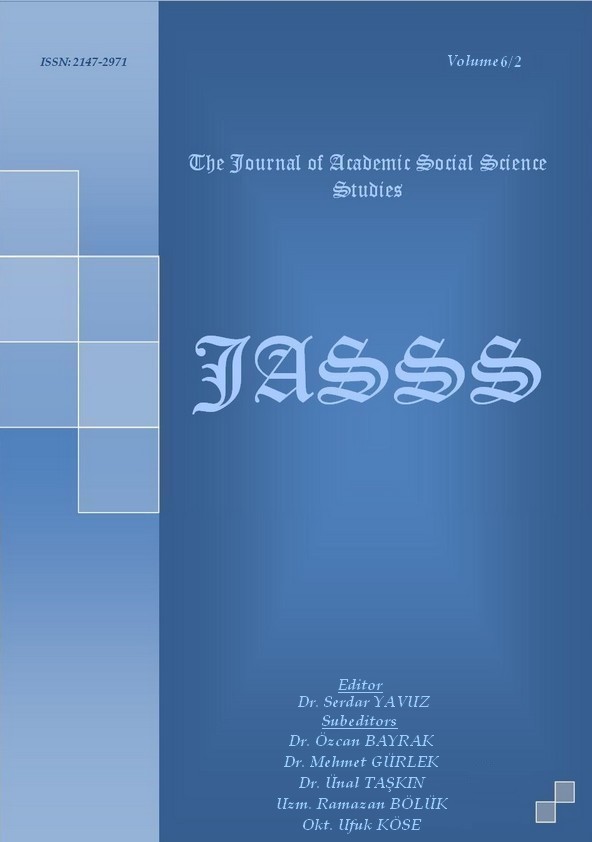GÖÇÜN EĞİTİM VE EĞİTİM YÖNETİMİNE ETKİSİNE İLİŞKİN OKUL YÖNETİCİLERİNİN GÖRÜŞLERİ (DİYARBAKIR İLİ ÖRNEĞİ)
Author :
Abstract
Bu araştırmanın amacı, okul yöneticilerinin görüşleri doğrultusunda Diyarbakır kent merkezine yapılan göçlerin eğitime ve eğitim yönetimine etkisini araştırmaktır. Araştırma; göçlerin eğitime ve eğitim yönetimine etkilerine okul yöneticilerinin gözüyle bakması ve araştırmacılara derinlemesine bir perspektif sunması yönüyle önemli görülmektedir. Bu bağlamda, Diyarbakır ili merkez ilçelerinde yer alan kamu ilköğretim ve ortaöğretim okullarından seçkisiz örnekleme yöntemiyle 30 okul idarecisine araştırmacılar tarafından hazırlanan yarı yapılandırılmış görüşme formu dağıtılmıştır. Görüşme formu okul idarecileri ve Eğitim Yönetimi, Teftişi, Planlaması ve Ekonomisi Dalı uzmanlarının görüşleri doğrultusunda kısmen değiştirilerek geliştirilmiş ve araştırmacı tarafından birebir okul idarecilerine uygulanmıştır. Verilerin çözümlenmesinde nitel araştırma yaklaşımlarından içerik analizi tekniği kullanılmıştır. Araştırma bulguları tablolar halinde verilerek, frekans ve yüzde değerleri verilmiş ve okul idarecilerinin görüşlerinden doğrudan alıntılar yapılmıştır. Okul yöneticilerinin çoğunluğu orta ve yüksek düzeyde göç alan bölgelerde yer alan okullarda görev yapmaktadırlar. Araştırmanın sonuçlarına göre, okul yöneticilerinin çoğu göçle gelen ailelerin sosyo kültürel açıdan okula olumlu bir etkisi bulunmadığını ve veli-öğretmen-öğrenci bağının yeterince kurulamadığını ifade etmektedirler. Göçle gelen ailelerde karşılaşılan en yoğun problem dil ve ekonomi kaynaklı iletişim problemleridir. Göçle gelen öğrencilerde karşılaşılan en yoğun problem ise uyum sorunu ve buna bağlı olarak gelişen davranış bozuklukları ve başarısızlıktır. Okul yöneticilerinin tamamına göre göçle gelen öğrenciler sınıf ve okul başarısını olumsuz etkilemektedirler.
Keywords
Abstract
The purpose of this study is to investigate the effects of migration to the center of Diyarbakır on education and education management in accordance with the reflections of school managers. The current study is significant in terms of looking at these effects from the school managers’ perspective and presenting in-depth view to the other researchers. In this respect, as an instrument a semi-structured interview form was conducted to the randomly chosen 30 school managers working at primary and secondary state schools located both in the city center and the central districts of Diyarbakır.The interview form was developed in accordance with the opinions of the experts in the Departments of Education Management, Supervision, Planning and Economy and conducted to the school administrators by the researcher. In order to analyze the data, the technique of content analysis applied in qualitative research was used. The research findings were tabulated through displaying the frequency and percentage values. Additionally, the opinions of school administrators were also cited. It was seen that the majority of school administrators worked at the schools located in areas which were exposed to the medium and high level of migration. According to the results of the study, the most of the school administrators stated that the migrant families, from socio-cultural aspect, did not have any positive effects on the schools and also they added that the parent-teacher-student bond couldn’t be established at all. The most common problem encountered in migrant families is the communication problems caused by language and economy. Moreover, the most common problem among migrant students is the problem of adaptation, behavioral disorders, and therefore, being failed. For all school administrators, the migrant students negatively affect both the success of the class and the school.





